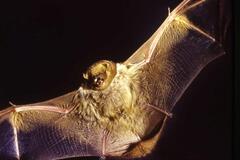CONSERVATION CORNER
A weekly blog for all things conservation
 By DAN RHODES BCCD Education Coordinator Please consider constructing or purchasing a bat house from the Game Commission to provide bats with places to live. If you turned on the TV this past month, you were likely to find no shortage of creepy horror movies with bats terrorizing the main characters. If you visited your local candy store to stock up on Halloween trick-or-treat supplies, you probably saw dozens of plastic bat decorations hanging from the ceilings to create the perfect Halloween atmosphere for shoppers. Bats, it seems, are consistently one of the most popular animals alive when it comes to adding scary effects to your favorite horror movie or getting people in the Halloween mood. For centuries, even before the invention of television, books such as Bram Stoker’s Dracula highlighted the bat as a sinister, bloodthirsty animal who was always out to get you. Is this hatred and fear toward bats really justified? What is the truth about bats and their relationship with humans? If you are a person that puts a lot of stock in the danger of bats from their favorite horror movie, the answers to these questions might surprise you.
Truth is there are few animals on planet earth that are MORE beneficial to human beings than bats! Out of the nine species of bats that call Pennsylvania their home, all of them eat insects during the spring, summer and fall months. The sheer volume of insects even a single bat can eat annually is staggering. One small year-round resident bat that hibernates during the winter in Pennsylvania is estimated to eat a mind-blowing 1 million insects per bat, per year! This means mosquitoes, emerald ash borers, spotted lantern flies, horseflies, invasive bees, beetles, stink bugs, gypsy moths, grain moths, agricultural pest insects, and other less than helpful bugs are on the menu. In fact, according to the Pennsylvania Game Commission, a single small colony of 150 big brown bats can eat enough cucumber beetles during the summer months to protect gardeners and farmers from the colossal damage that a whopping 18 million rootworm larvae would otherwise inflict on crops! The little brown bat species in Pennsylvania can eat an astounding 1,200 mosquitoes per HOUR throughout the night during the summer months. This equates to a single small colony of 100 little brown bats eating a conservative estimate of 720,000 mosquitoes PER NIGHT! Imagine the potential for diseases such as west nile virus and even yellow fever that would spread if this many additional mosquitoes were prowling the skies looking to bite people, pets, native birds, and wildlife. Worldwide, especially in the tropical zones, mosquito borne illness from these and other diseases such as malaria, are still to this day, responsible for thousands of human fatalities annually. While helping to stop the spread of insect-borne illness, bats are also almost never responsible for spreading disease to humans directly. The pervasive fear that bats present a significant risk to humans by spreading rabies is quite unfounded. In fact, feral cats, skunks, raccoons, and other common mammals are many times more likely to contract or spread rabies, while the minuscule percentage of bats that might get rabies quickly die from the infection without spreading it throughout their colony. Near dusk or at nighttime when people claim to see bats dive-bombing and ‘attacking’ them; the bats here in PA are only attacking the bugs that are coming to bite YOU! Furthermore, their ability to use eco-location to avoid inadvertent collisions, even in complete darkness means that the odds of them getting tangled up in your hair or clothing are almost nil. Sadly, because of an imported fungus called white nosed syndrome, 99% of our local bat populations have died out over the past decade throughout much of the state. Now more than ever, people need to realize the important role bats play to help keep our food growing and keep pest insects from spreading disease to humans and wildlife. Many places in Bradford County might have a lot of insects for bats to eat, but few places for them to roost during the day. Please consider constructing or purchasing a bat house from the Game Commission to provide bats with places to live that are near good insect food sources and are fungus free. This will also encourage bats to take up residence in the boxes rather than try to enter people’s homes and create a nuisance. Instead of just killing bats that may enter your home, please consider contacting the game commission or a qualified pest control specialist that can remove the bats without a need to euthanize them. For these and many other reasons, I hope you can look at bats this fall with a little bit more respect and a little less fear. Hope you had a happy and safe Halloween!
0 Comments
Leave a Reply. |
AuthorsVarious staff at the Bradford County Conservation District Archives
July 2024
Categories
All
|
|
Bradford County Conservation District
Stoll Natural Resource Center 200 Lake Road, Suite E | Towanda PA 18848 Phone: (570)-485-3144 |
